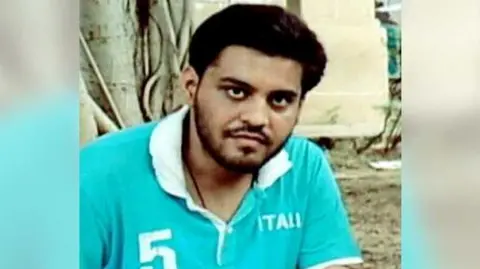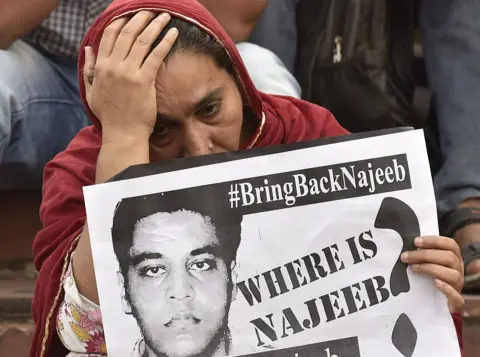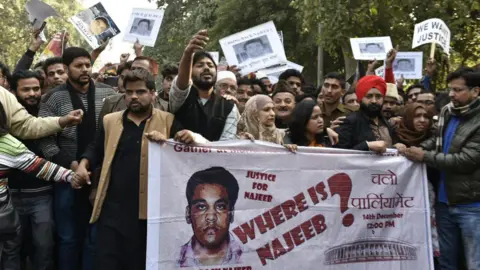BBC Hindi
 Najeeb Ahmed’s family
Najeeb Ahmed’s familyNine years ago, an Indian student vanished into thin air.
Najeeb Ahmed was studying biotechnology at the prestigious Jawaharlal Nehru University (JNU) in Delhi, when he mysteriously went missing in October 2016.
The night before his disappearance, the then 27-year-old who lived in one of the university’s residential hostels was involved in a scuffle with members of the Akhil Bharatiya Vidyarthi Parishad (ABVP), a right-wing student group. The students have denied any involvement in his disappearance.
For years, India’s crime-fighting agency, the Central Bureau of Investigation (CBI), has been trying to figure what may have happened to Mr Ahmed – the agency took over the case from city police in 2017.
Now a court in Delhi has finally shut the investigation after the CBI said it had exhuasted all possible leads in the case.
“As a parting note, the court earnestly hopes that Najeeb Ahmed shall be traced soon,” the court said in the order, which was announced last month.
Mr Ahmed’s family, however, have alleged the inquiry was not conducted in a proper manner and said they would appeal the decision in a higher court.
“What message does it send, that India’s premier investigating agency has not been able to find a missing student from one of India’s best universities?” Mr Ahmed’s mother Fatima Nafees told BBC Hindi.
“We will not give up until we find our son.”
Born in a village in Uttar Pradesh, Mr Ahmed, the son of a carpenter, was the eldest of four. His family made many sacrifices to support his JNU education.
“After completing his undergraduate degree, he was adamant that he wanted to study at JNU,” Ms Nafees said.
“I told him you can take admission, but you won’t stay in the hostel. You are too naive. But he didn’t listen to me.”
 Hindustan Times via Getty Images
Hindustan Times via Getty ImagesOn the night of 14 October, 2016, Mr Ahmed reportedly got into a scuffle with a group of students affiliated to ABVP who were campaigning for hostel elections. JNU is known for its vibrant and intense student politics, with ideological groups often clashing over campus issues.
In his testimonies to the CBI, his roommate Mohd Qasim said that Mr Ahmed got injured in the altercation and had to be taken to a public hospital, where he was allegedly refused treatment.
The doctors told him they could not treat his wounds without a formal crime complaint having been made to the police, his roommate alleged.
According to the court order, Mr Ahmed chose not to file a complaint and returned to campus. He went missing the next day, leaving behind his phone, wallet, and clothes in his hostel room.
A CBI report says Mr Ahmed last used his phone and laptop around 10am the day he disappeared. A hostel warden told the agency that he saw Mr Ahmed getting into a tuk-tuk in the morning and leaving campus.
Ms Nafees, who had been informed of the scuffle over phone by Mr Ahmed’s roommate, was on her way to Delhi to see her son. She arrived in the morning and upon finding him missing, filed a missing persons complaint on 15 October 2016.
For days, there was no progress. Protests erupted on campus as students and activists accused authorities of inaction.
In November 2016, Ms Nafees filed a petition in the Delhi High Court, accusing the police of being “slow, misdirected and subjective” and called for a court-monitored probe.
A month later, Delhi Police conducted two extensive searches using sniffer dogs across JNU’s sprawling campus – but again, nothing was found.
In May 2017, the court handed over the investigation to the CBI.
A year later, the CBI told the court it had exhausted all possible leads – and asked the bench to close the case.
The agency said it had examined more than 500 witnesses, collected information from taxi, bus, train and flight operators, and searched hospitals and morgues, but had found nothing.
A one million rupees [$11,600; £8,600] reward for information about Mr Ahmed also failed to yield results, investigators argued.
The case dragged on for two more years, when in 2020, Ms Nafees returned to court, this time to challenge the CBI’s conclusions.
She alleged the agency failed to properly probe the students involved in the scuffle with her son. She said they had a “clear motive”, had threatened him, and should have been arrested. The CBI denied all allegations saying they had left “no stone unturned” in looking for Mr Ahmed.
The agency said it had tracked the phone locations of the nine students involved in the fight with Mr Ahmed that night, but found no evidence linking them to his disappearance.
 Hindustan Times via Getty Images)
Hindustan Times via Getty Images)Explaining its decision to finally shut the case, a court in Delhi said that the CBI has investigated “all plausible avenues” thoroughly but “no credible information” could be received about Mr Ahmed’s whereabouts.
The judge dismissed Ms Nafees’ plea, noting that while witnesses confirmed verbal threats, there was no “direct or circumstantial” evidence linking Mr Ahmed’s disappearance to the fight with ABVP members.
“Such scuffles and exchanges are not unheard of” in the charged atmosphere of JNU, the order added.
The court, however, added that the CBI could reopen the case if new information comes to light.
The order has been a huge blow for Mr Ahmed’s family and well-wishers.
Colin Gonsalves, who represented Ms Nafees in the Delhi High Court in 2018, said he still questioned the investigation.
“The police routinely arrest people for minor crimes in India. It’s shocking then, that none of the students were taken into custody for questioning,” he said.
Ms Nafees alleges that her son’s religion had affected the seriousness of the investigation.
“If the victim had been a Hindu boy, would the police have responded the same way?” she asked.
“They would have demolished the houses of those suspected,” she alleged, referring to the rising instances where homes of individuals accused of crimes are bulldozed by Indian authorities. The BBC has reached out to the CBI for comment.
However, the agency has consistently maintained that they have carried out the probe impartially. In 2018, the Delhi High Court had said that they had found no evidence that CBI investigated the case unfairly or “under political compulsions”.
Ms Nafees says she’s not done fighting. Every 15 October, the day her son vanished, she joins a candle march at JNU in his memory. The hope has dimmed, but the wait continues.
“Sometimes I wonder if I should put a nameplate outside our house,” said Nafees Ahmed, his father.
“Our house has been renovated. What if he comes, but can’t recognise it?”
Follow BBC News India on Instagram, YouTube, Twitter and Facebook.

